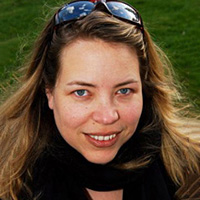Jane Springer
Class of 1992

Jane Springer's first book, Dear Blackbird, won the Agha Shaid Ali prize (University of Utah Press, 2007). Her second book, Murder Ballad, just won the Beatrice Hawley Award and is forthcoming from Alice James Books in May 2012. Her other awards include the Robert Penn Warren Prize for Poetry, an NEA grant, and a Whiting Award. She currently teaches poetry at Hamilton College, in upstate, New York, where she lives with her husband, John Powell, their son, Morrison, and their two dogs, Walter-Woofus and Georgia.
Can you tell us how majoring in Creative Writing at UE has helped you?
The major gave me a broad knowledge-base in writing and literature that more than prepared me for graduate school. In short, it allowed me to pursue my dream of becoming a poet and professor.
What did you come away with?
I formed friendships with peers and professors there that lasted long after graduation and utterly debunked the myth that writing is a "solitary" practice.
What did you learn here that you don't think you could have learned any other place?
UE professors encouraged me to address questions that concern us all in writing as well as to craft poems with an eye towards their long-lastingness. A spiritual approach I've much appreciated since leaving—as I understand that the goal of writing is not so much to publish works by the pound, but to engage thoughtfully (and playfully) in the process writing of them.
Did you have any memorable experience (in or out of the classroom) that changed you as a writer or a creative thinker?
Yes. Too many to list. Here's one: Dr. Carson read poems with a sonorous voice that unearthed their music while conveying meaning. I learned, from him, that more than half the work of teaching poetry is accomplished by loving it. He read our student poems with the same care as he read Milton, so we could not help but take our own work seriously.
Here's another: Dr. Baer taught me there was "freedom in form" and assigned formal poem exercises that seemed restrictive if not impossible to complete at the time. I'm a free verse poet, now, but when I "get stuck" I write in form and it always helps me find solutions to the various problems I am having—who knew? (He did.)
I could go on for days listing concrete examples from each professor I took a class from—and those examples would not be limited to the classes I took in creative writing. Core curriculum classes I took in psychology, anthropology, theater, literature, art history, ceramics, etc. all informed my writing/teaching in interesting ways.
The artists in residence program: I met/worked with Galway Kinnell, William Stafford, Nancy Willard, Bruce Weigel, and many other terrific writers while there—time spent with them was no less valuable than time spent with the writers on the faculty.
Reading: Student writers read more than we wrote at UE. Tolstoy, Austen, Garcia-Marquez, Fielding, Dickinson, Mishima, Dillard, O'Connor—what would I write if I did not have their sentences rolling around in my skull?
Open Doors: I had no idea how valuable the time of my professors was. Each hour they spent with me in an office was an hour of research or writing sacrificed for my learning. I understand that now—and am so thankful for their generosity. None of that time spent was wasted.
Office Phone
812-488-2963
Office Email
ML281@evansville.edu
Office Location
Room 329, Olmsted Administration Hall
